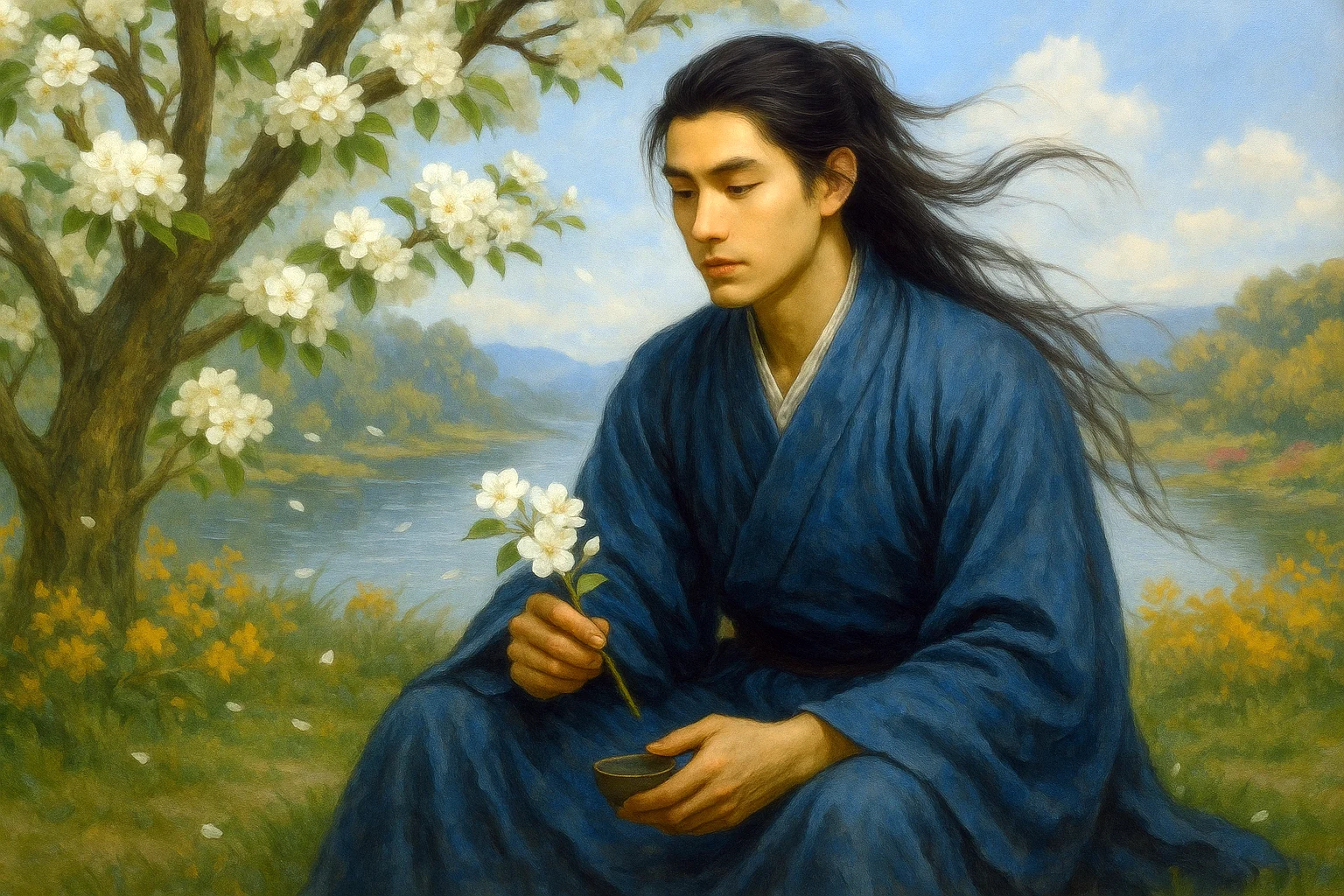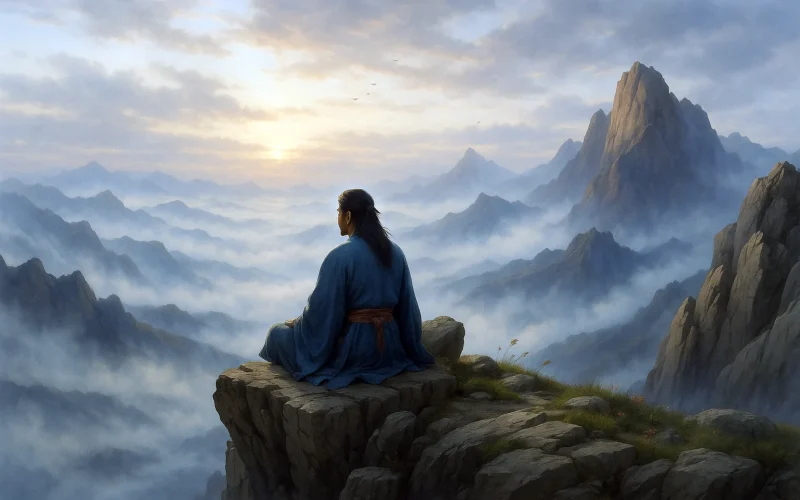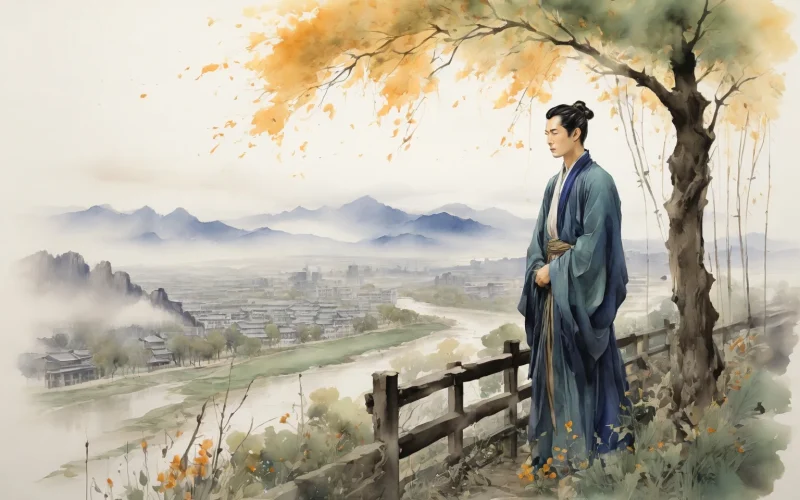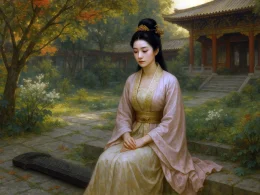Our paths have parted—
only the fallen blossoms reach this quiet mountain.
Mist dims the reeds along the shadowed stream,
while moonlight stirs the willows in a whispering wind.
The passing years have vanished in a breath,
and once-bright hopes drift hollow and undone.
Why must we wait till old age to meet again,
to speak at last of dreams long left behind?
Original Poem
「山中期吉中孚」
李端
行人路不同,花落到山中。
水暗蒹葭雾,月明杨柳风。
年华惊已掷,志业飒然空。
何必龙钟后,方期事远公。
Interpretation
Composed during Li Duan's mid-Tang reclusive years, this poem captures the poet's unfulfilled anticipation for his dear friend Ji Zhongfu amidst mountain solitude. Written during a period of unrealized ambitions, the verses transform a simple missed rendezvous into profound meditations on time's passage and unfulfilled aspirations. Blending serene landscapes with intellectual yearning, the work exemplifies Li Duan's signature fusion of lyrical purity and philosophical depth.
First Couplet: "行人路不同,花落到山中。"
Xíngrén lù bù tóng, huā luò dào shān zhōng.
Our paths diverge like migrant birds—
While I remain as petals bury these slopes.
The opening lines etch separation in nature's language. "Divergent paths" (路不同) suggest more than physical distance—a schism of destinies. The falling petals (花落), traditionally symbolizing faded youth, now become a shroud for solitary waiting.
Second Couplet: "水暗蒹葭雾,月明杨柳风。"
Shuǐ àn jiānjiā wù, yuè míng yángliǔ fēng.
Reeds drown in ink-dark waters veiled by mist;
Moonlit willows dance with the wind's invisible hand.
Nature mirrors emotional paradox: the obscured reeds (蒹葭雾) contrast with luminous clarity above (月明). This vertical tension—between drowning and ascension—embodies the poet's suspended state between earthly disappointment and transcendental yearning.
Third Couplet: "年华惊已掷,志业飒然空。"
Niánhuá jīng yǐ zhì, zhìyè sà rán kōng.
Years startle me—already cast away like dice;
Life's work rustles into hollow echoes.
Time becomes a gambler's reckless throw (掷), while ambitions dissolve into sound without substance (飒然空). The visceral verb "startle" (惊) reveals how passivity has led to this precipice of realization—a moment where all potential seems already spent.
Fourth Couplet: "何必龙钟后,方期事远公。"
Hébì lóngzhōng hòu, fāng qī shì Yuǎngōng.
Must we wait until our hands tremble with age
To pursue what Master Huiyuan grasped in his prime?
The closing challenge cuts through complacency. "Trembling hands" (龙钟) symbolize deferred dreams, while the reference to Huiyuan—the Jin dynasty monk who established Pure Land Buddhism—rebukes all procrastination of spiritual or intellectual quests.
Holistic Appreciation
Composed while awaiting a friend in the mountains, this poem blends scene and sentiment with profound resonance. The line "our paths diverge" underscores life’s unpredictable partings, while falling blossoms, mist-laden reeds, and moonlit breezes paint an atmosphere of solitude and quietude. Moving from imagery to introspection, the poet reflects on time’s passage and unfulfilled aspirations, ultimately arriving at an epiphany: "Do not wait till old age to pursue purpose."
Though Li Duan voices loneliness and regret, he avoids self-pity, instead turning contemplation into resolve. His rejection of fame in favor of moral integrity shines through. The language is distilled, the imagery fresh, the tone restrained yet lofty—a testament to his idealistic spirit.
Artistic Merits
Set against serene nature, the poem employs delicate scenery and emotional pivots to deepen its expression. From the solitude of "blossoms falling in the mountains" to the stillness of "reeds veiled in dark mist", then the lament "startled, I find years slipped away", it culminates in the philosophical resolve to "seek distant enlightenment now." Tightly structured and rich in reason, its concise language and effortless imagery showcase Li’s mastery of five-character verse and his noble, reflective mind.
Insights
This poem urges us to recognize life’s brevity and avoid deferring dreams. Amidst change and uncertainty, we must anchor ourselves in the present, pursuing ideals with quiet determination. Through mountain stillness and philosophical clarity, Li Duan embodies an unwavering, transcendent stance—a reminder, amid modern chaos, to stay awake and true.
About the Poet

Li Duan (李端, c. 743–785), a native of Zhaoxian in Hebei Province, was among the "Ten Literary Talents of the Dali Era" during the Mid-Tang period. He excelled particularly in five-character regulated verse, crafting poetry of refined elegance and subtle nuance. His works frequently explored themes of reclusive living and the melancholy of separation, with over 250 poems preserved in the Complete Tang Poetry anthology.












